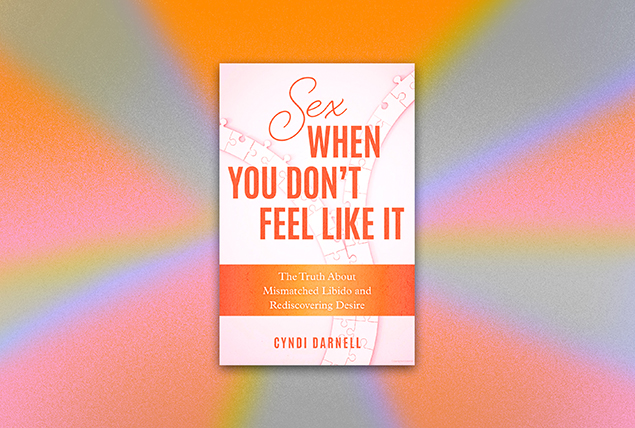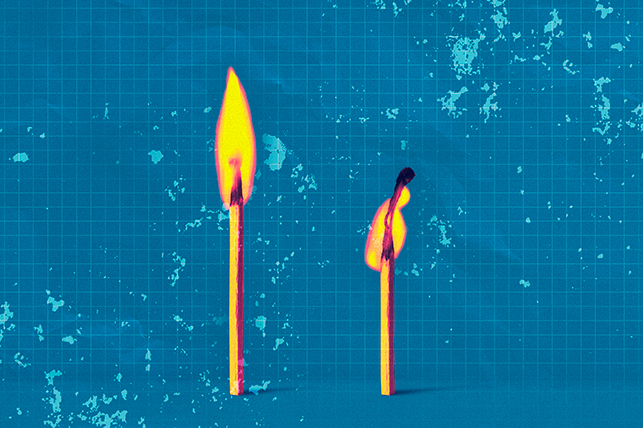Between the Pages: 'Sex When You Don't Feel Like It' Looks at Libido

If you have an interest in learning what makes you tick sexually, consider picking up the engrossing new book, "Sex When You Don't Feel Like It: The Truth About Mismatched Libido and Rediscovering Desire."
Author Cyndi Darnell wants readers to know they're not broken because of their low sexual desire, and framing sex differently can open up a new world of possibilities. Drawing on the latest sexuality research, "Sex When You Don't Feel Like It" is a step-by-step practical guide to tackling issues with libido. Throughout, Darnell asks the reader to stop the blaming and instead rekindle the pleasure they desire in their life.
Originally from Melbourne, Australia, Darnell now resides in New York City and has been in practice as a certified clinical sexologist for about two decades. A self-described "pleasure enthusiast," Darnell offers sex coaching, holistic counseling, marriage counseling and more.
In this exclusive interview with Giddy, Darnell discusses the difference between arousal and desire, the importance of an erotic template and a common myth that may surprise you.
Editor's note: This interview has been edited for length and clarity.
What led you to write 'Sex When You Don't Feel Like It'?
Darnell: I wrote it because [low desire] is the most common issue people present to a sex therapist. It occurs across genders and orientations. It's something a lot of people struggle with. While, historically, medical providers have attempted to solve the problem with pills, the bottom line is desire is not something that can be solved with drugs because it's about a state of mind. It's about how you live your life.
I wrote the book to show people they're not broken and express why their feelings are real. There are lots of different ways for them to ignite their desire, and horniness is only one of literally hundreds.
What is an 'erotic template' and why is it important?
It's basically the user manual to what gets you going. It's unique and individual to you as a fingerprint insofar as we all have fingers and fingerprints, but they don't look the same.
In this way, erotic templates share a common lineage. They're all sorts of excavations between the mind, the body and the emotions. But how they play out for a particular person is going to be dependent on their erotic history, their experience, their access to partners, how those partners treat them and what they believe to be true about sex.
All these things are going to influence how they experience themselves as sexual beings, because sex is less about how we connect with our partners and more about how we connect with ourselves. If we can't connect with ourselves sexually, it's very hard to bring that quality to a partnership because nobody else can bring it out of us.
Knowing oneself sexually is the essence of sexual exploration. Who are you as a sexual being? But also recognizing that that's going to change. It's going to change as you age and as you have different experiences. There are so many variables, and the common thing is that people have been tricked into thinking sex is this very finite, specific, intercourse-focused practice that occurs.
There's also a very strong emphasis on sex being genital-focused. It has to be in a bed. It has to involve penetration of some kind. It can involve all of those things, but doing that on repeat is going to get boring. That doesn't mean that the partnership or the relationship is boring.
The body acclimates to whatever it receives. Whether you're receiving the same food every day or the same touch every day, you're still going to like it, but you're not going to want it.
Teaching people how to read their own erotic template effectively allows them access to the user manual. They can share that knowledge with other people in ways suitable to them.
How does desire differ from arousal?
Desire is of the mind and the emotions, whereas arousal is of the body. Arousal is the swelling, the engorgement, the lubrication, the flushing of the cheeks. Desire is the erotic imagination. It's feeling connected. It's feeling close or feeling excited, or it's feeling a little trepidatious but a little bit curious.
We can produce desire and arousal within ourselves. Masturbation generally produces arousal, but it doesn't necessarily produce desire. It can. But I think a lot of people get confused between desire and arousal. This is why drugs like Viagra have been misunderstood. Viagra is an arousal drug. It's not a desire drug. Viagra will give you an erection, but if you don't desire your partner, Viagra is not going to do anything about that. You're just going to have an erection and still dislike your partner. This is why pharmacological interventions are very limited.
Desire is about your relationship to your erotic world—the thoughts, the feelings—less so the sensations; that's more arousal. That said, there are sensations people experience that will produce feelings of desire. A lot of people might feel the mental desire but don't have the physiological arousal. Or they feel the physiological arousal, but mentally, they're not engaged. It's something common for a lot of people, particularly women, and it leads them to think they're broken when they're not.
One of the myths you list is that 'sex is natural.' Are you saying sex is unnatural?
I think the instinct is natural and the inclination toward erotic curiosity is natural, but the practice of sex, the actual art of the doing, is not natural. It's learned. Because the first time we have sex, we don't know what we're doing. We don't know what feels good. We default to what we think we're supposed to do because we saw it in a movie or somebody told us at school. There are a lot of places we get our sexual information, most of which are not reliable sources. Most are steeped in narratives that trick us into believing sex is for making babies. But that's not why people have sex. Occasionally they have sex to make babies. But mostly, that's not why.
If we're not trying to make babies, there's no reason to default to intercourse as real sex and then to call everything else foreplay. We should be calling all of it sex. And we need to learn how to do it, all of it, in ways that produce pleasure for all parties involved. Traditionally, pleasure has been something predominantly available to penis owners. And even then, it's been pretty truncated.
What do you learn about clients when you ask them, 'Why do you have sex?'
They've never really been taught to think about sex that way, so it's always a shock. Often, I'll need scaffolding around that, because it's a very strange question when it's first posed to somebody. We've never been taught to think about sex as something we have any agency with. It's almost like you get into a relationship and there's an expectation that there's an obligation. If it's going to be a "real" partnership, you have to be having sex with each other. Where did this come from? This is a hangover from old patriarchal times when the expectation was the man would have sex with the woman and she would just be receptive to it; whether she enjoyed it or not was irrelevant.
If we don't know why we're doing something—having sex, eating a cookie, driving a car, anything really—if we have no comprehension of what our motivation is, it's very easy to disconnect from. It's very easy to lose sight of why we should even bother channeling any energy into it. Because for people who are like, "I don't even know why I'm doing this," I would probably say, "Then don't." Don't have sex from a place of obligation unless obligation is something you're OK with. I do question how sustainable it is.
When people have permission to start talking about what parts of themselves they want to meet during sex, it really shifts the narrative and they can start really formulating much richer answers around the why.
I ask, "Do you always have an orgasm from partnered sex?" The women usually say no and the men say most of the time. At the same time, I don't buy that orgasm is why people have partnered sex, because orgasms are more reliable in a solo context. Why would we bother dragging somebody else into it if it was just to have an orgasm? This is why I really encourage people to dig a bit deeper. If you want to share sex with another person, there is some other motivation going on, so let's dig into that.


















